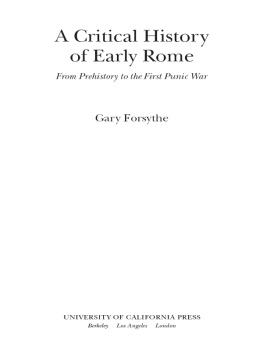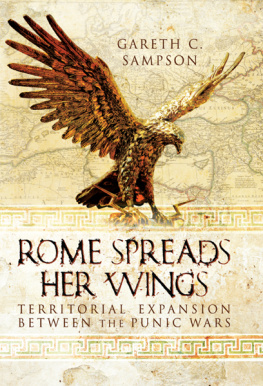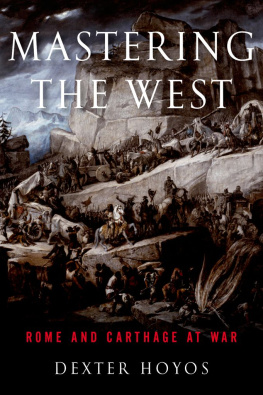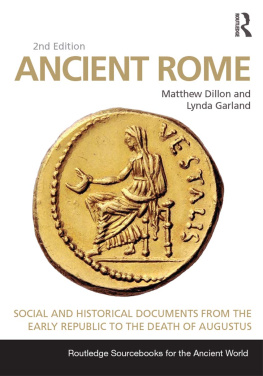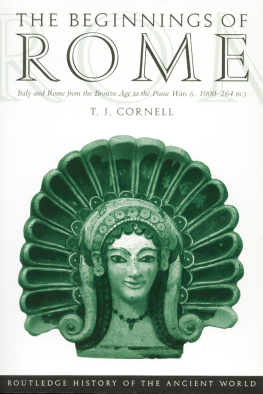Forsythe - A critical history of early Rome: from prehistory to the first Punic War
Here you can read online Forsythe - A critical history of early Rome: from prehistory to the first Punic War full text of the book (entire story) in english for free. Download pdf and epub, get meaning, cover and reviews about this ebook. City: Berkeley;Rzym, year: 2005, publisher: University of California Press, genre: Romance novel. Description of the work, (preface) as well as reviews are available. Best literature library LitArk.com created for fans of good reading and offers a wide selection of genres:
Romance novel
Science fiction
Adventure
Detective
Science
History
Home and family
Prose
Art
Politics
Computer
Non-fiction
Religion
Business
Children
Humor
Choose a favorite category and find really read worthwhile books. Enjoy immersion in the world of imagination, feel the emotions of the characters or learn something new for yourself, make an fascinating discovery.
- Book:A critical history of early Rome: from prehistory to the first Punic War
- Author:
- Publisher:University of California Press
- Genre:
- Year:2005
- City:Berkeley;Rzym
- Rating:4 / 5
- Favourites:Add to favourites
- Your mark:
- 80
- 1
- 2
- 3
- 4
- 5
A critical history of early Rome: from prehistory to the first Punic War: summary, description and annotation
We offer to read an annotation, description, summary or preface (depends on what the author of the book "A critical history of early Rome: from prehistory to the first Punic War" wrote himself). If you haven't found the necessary information about the book — write in the comments, we will try to find it.
Forsythe: author's other books
Who wrote A critical history of early Rome: from prehistory to the first Punic War? Find out the surname, the name of the author of the book and a list of all author's works by series.
A critical history of early Rome: from prehistory to the first Punic War — read online for free the complete book (whole text) full work
Below is the text of the book, divided by pages. System saving the place of the last page read, allows you to conveniently read the book "A critical history of early Rome: from prehistory to the first Punic War" online for free, without having to search again every time where you left off. Put a bookmark, and you can go to the page where you finished reading at any time.
Font size:
Interval:
Bookmark:
ABBREVIATIONS
| ad Att. | Cicero, Letters to Atticus |
| ad Q. Fr. | Cicero, Letters to His Brother Quintus |
| Akten 1981. | Akten des Kolloquiums zum Thema die Gttin von Pyrgi: Archologische, Linguistische und Religionsgeschichtliche Aspekte (Tbingen, 1 67Januar1979). 1981. Instituto di Studi Etruschi ed Italici, Florence. Appian Bell. Civ. Appian, Bella Civilia |
| Aug. Civ. Dei | Augustine, City of God |
| Caes. Bell. Gall. | Caesar, Bellum Gallicum |
| CAH | Cambridge Ancient History |
| Cat. | Cicero, Against Catiline |
| CIL. | Corpus Inscriptionum Latinarum |
| Cic. Amic. | Cicero, De Amicitia |
| Cic. De Re Pub. | Cicero, De Re Publica |
| Cic. Phil. | Cicero, Philippics |
| Cic. Tusc. Disp. | Cicero, Tusculan Disputations |
| CLP | Civilt del Lazio Primitivo, Exhibition Catalogue |
| CSE | Corpus Speculorum Etruscorum |
| Diod. | Diodorus Siculus, The Library |
| Dion. Hal. | Dionysius of Halicarnassus, Roman Antiquities |
| Frontinus Strat. | Frontinus, Stratagems |
| Gell. | Aulus Gellius, Attic Nights |
| Hdt. | Herodotus, The Histories |
| ILLRP | Inscriptiones Latinae LiberaeRei Publicae |
| ILS | Inscriptiones Latinae Selectae. H. Dessau, ed. 18921916. |
| Pliny NH | Pliny the Elder, Natural History |
| Plutarch QR | Plutarch, Roman Questions |
| Plutarch Rom. | Plutarch, Life of Romulus |
| Polyb. | Polybius, Histories |
| Sallust Bell. Iug. | Sallust, Bellum Iugurthinum |
| Seneca Controv. | Seneca the Elder, Controversiae |
| Serv. ad Aen. | Servius, Commentary on the Aeneid of Vergil |
| Serv. ad Ecl. | Servius, Commentary on Vergil's Eclogues |
| SIG | Sylloge Inscriptionum Graecarum |
| Suet. Tib. | Suetonius, Life of Tiberius |
| Suet. Vitellius | Suetonius, Life of Vitellius |
| Tacitus Ann. and Hist. | Tacitus, Annales and Histories |
| Theophrastus Hist. Plant. | Theophrastus, Historia Plantarum |
| Thuc. | Thucydides, The Peloponnesian War |
| Ulpian Tit. | Ulpian, Tituli |
| Val. Max. | Valerius Maximus, Memorable Deeds and Sayings |
| Varro Ling. Lat. | Varro, De Lingua Latina |
| Vell. Pat. | Velleius Paterculus, History |
| Vir. Ill. | De Viris Illustribus |
The many debts of gratitude incurred in the course of researching and writing this book are too numerous to be easily enumerated, but common decency requires that the author at least make an attempt to acknowledge the most obvious and important ones. Thanks are due to Kurt A. Raaflaub, A. John Graham, Martin Ostwald, Michael Alexander, Brent Vine, Mark Toher, Richard Mitchell, and Ernst Badian for their comments, criticisms, and suggestions. Thanks are due also to Kate Toll, the copy editrix, whose intelligent and well-informed editing of the text has made it more readable. A great debt is owed to Scott Pathel for his computer expertise employed in the preparation of the maps and other illustrations used in this book. Thanks are due to the people at the reference desk in the Westchester Public Library in Chesterton, Indiana for their assistance in obtaining many books and articles through inter-library loan.
Although the author was occupied with the research and writing of this book from the summer of 1997 to the spring of 1999, in a certain sense this book has been in the making for very many years; and as a direct consequence of the author's blindness, he is greatly indebted to many friends and fellow college students, who over the years have given him many hours of their time in order to read books and articles to him. Out of this very long list of devoted volunteer readers the author wishes to mention by name the following persons whose voices recorded on tape have been the author's constant companions as he wrote the present volume: Lloyd Daly, Peter Denault, Becky Harrison, Sarah Kimball, Scott Rusch, Nell Wright, Sina Dubovoj, and especially Terry Trotter (who now teaches mathematics in San Salvador), Peg Decker (who died at about the time the work on this book was begun), Kitty Reip and her sister Kandi Kaliher (the latter of whom died of cancer in November of 1994). Special thanks are also due to the author's dear college friend of many years ago, Bryan McMurray, and his gracious wife, Joanna, for allowing the author to enjoy the hospitality of their home in Champaign, Illinois, while he made use of the University of Illinois's vast library resources. Unfortunately, due to her death the author's wife, Dorothy Alice Forsythe, was not able to assist in the final proofreading of the copyedited text. This task was carried out by a very dear friend, Marnie Veghte. Yet the greatest debt of gratitude by far is owed to the author's wife, Dorothy, for her countless hours of assistance in every conceivable capacity. Attempting to record the innumerable ways in which this book is indebted to this extraordinary woman would involve an entire chapter of its own.
From the year 300 B.C. onwards the Roman list of consuls is secure, and Roman dates are absolute, but this is not the case for the period preceding 300 B.C. The reason for this needs to be understood in order to appreciate fully the historical and historiographical difficulties surrounding some of the more important problems of early Roman history.
The dates used throughout this book for Roman affairs before 300 B.C. are those of a chronological system worked out by the Roman antiquarian Atticus, who published it in his Liber Annalis (Book of Chronology) in 47 B.C. This chronology was accepted by Varro (hence the modern term Varronian chronology) and was consequently employed thereafter by the Roman state as the official system for determining an absolute date from the supposed foundation of Rome (ab urbe condita). Thus, this scheme was used in the famous Augustan inscriptions listing Rome's chief magistrates from the beginning of the republic and the celebration of triumphs from the reign of Romulus, the Fasti Capitolini and the Fasti Triumphales. Because of its widespread use and acceptance during imperial times, it has been generally adopted by modern scholars for the sake of convenience.
The Varronian chronology dates the foundation of Rome to the year 753 B.C., the first year of the republic to 509, the Gallic capture of the city to 390, and the first plebeian consulship to 366 B.C. It also includes an anarchy for the five-year period 375371 (i.e., years in which allegedly no consuls or consular tribunes were elected), as well as four dictator years for 333, 324, 309, and 301 B.C. The latter were years for which there were no consuls recorded, but instead a dictator and a master of the horse were supposed to have been in office for the entire year. Drummond (1978a) has cogently argued that the dictator years were first invented by Atticus partly in response to Julius Caesar's tenure of the dictatorship beyond a six-month term during the 40s B.C., but they were also probably used by Atticus to make minor adjustments to Roman chronology of the late fourth century so as to synchronize Roman affairs with events in Greek history. Furthermore, a fragment of N. Fabius Pictor, who wrote a history of Rome in Latin toward the end of the second century B.C., indicates that this work did not contain any years of anarchy, suggesting that these five years were a later annalistic invention (see above p. 264).
Font size:
Interval:
Bookmark:
Similar books «A critical history of early Rome: from prehistory to the first Punic War»
Look at similar books to A critical history of early Rome: from prehistory to the first Punic War. We have selected literature similar in name and meaning in the hope of providing readers with more options to find new, interesting, not yet read works.
Discussion, reviews of the book A critical history of early Rome: from prehistory to the first Punic War and just readers' own opinions. Leave your comments, write what you think about the work, its meaning or the main characters. Specify what exactly you liked and what you didn't like, and why you think so.

